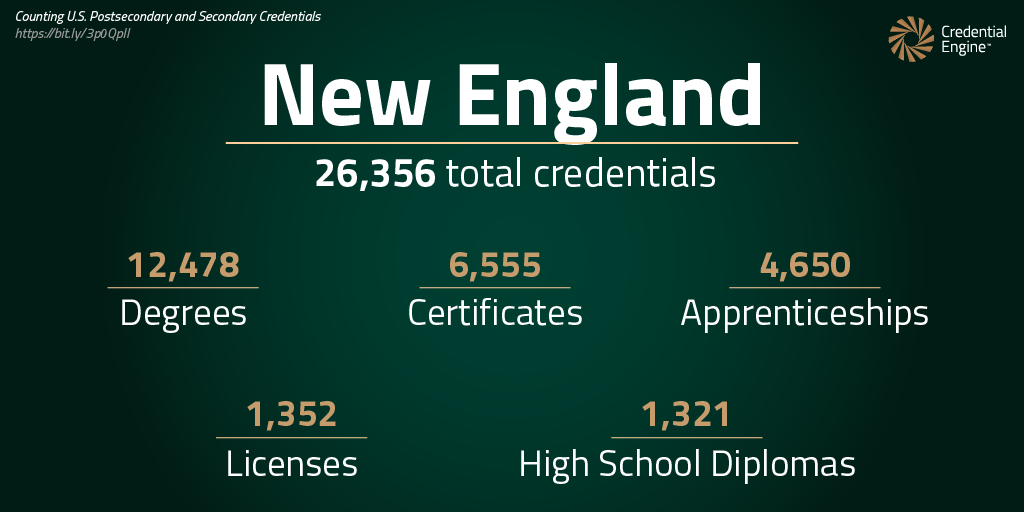
Why We’re Committed
The New England Board of Higher Education (NEBHE), in partnership with Credential Engine and through a grant from the Lumina Foundation, is giving every state in the region a way to identify high-value credentials in high-demand sectors, such as biosciences, IT, and healthcare. Through the High Value Credentials for New England (HVCNE) initiative, NEBHE is working with state agencies, systems, and institutions across the region to publish credentials to the Credential Registry so that all New Englanders have information about credentials from secondary and postsecondary institutions, professional education and training providers, and industry associations and employers. These efforts will serve to better align postsecondary education and workforce development in the region and provide New Englanders with greater access to high-quality education, training, and employment options. Institutions, policymakers, and employers will also better understand the skills and competencies signified by those credentials.
About
New England Board of Higher Education (NEBHE)
The Regional Value of a Common Credentialing Language
In May 2018, NEBHE and Credential Engine began bringing to life a plan to publish higher education credentials to the Registry and map those credentials to the Credential Transparency Description Language (CTDL). Prior to this work, information about education and training opportunities were described inconsistently — making it difficult to identify, compare, and connect credentials across state lines. Leaders across New England recognize that students and employers alike are increasingly interested in better understanding skills, competencies, and knowledge in addition to credit hours and seat-time. While the needs within the region can vary widely especially in a rapidly changing economy, ensuring that rich information about all credentials — from degrees to badges — is made publicly accessible will help leaders keep pace with quickly changing industries and skill requirements. While each state has its own goals and processes, HVCNE ensures that there is consistent information about credentials available across the region so people’s needs are met in every state.
What Determines a High-Value Credential in New England?
The changing nature of work in the coming decades will create an increased demand for a hybridization of skills and upskilling of competencies and knowledge among the workforce. To that end, NEBHE determined that a credential of value should prepare graduates not only to perform well in their next job, but also make successful workforce transitions throughout their careers. That’s why it’s even more critical for the region to describe credentials and their competencies using a common language and share information using a common data infrastructure.
Labor-market alignment isn’t the only marker of value. An HVCNE advisory committee found that in New England, characteristics of a high-value credential include:
- Represents the first step along a pathway that leads to a satisfying career with family-sustaining wages (i.e., a certified nursing assistant license may pave the way to a career as a licensed practical nurse or registered nurse).
- Fills a community need, such as teachers, healthcare professionals, police officers and others.
- Is portable across state lines.
- Is affordable due through financial support institutions, employers, or state or federal sources.
- Offers valuable types of learning opportunities, including work- or competency-based education.
To that end, credentials published to the Registry from New England contain a minimum set of key information, including program duration, location, requirements, cost, competencies, learning opportunities, and associated occupations and industries. By presenting this information clearly and uniformly, credential seekers can make better comparisons and connections between options.
Enabling A Groundswell of Credentials
Through the collaboration between HVCNE and Credential Engine, close to 1,500 unique credentials from New England have been published to the Registry. NEBHE and Credential Engine have also created a Credential Finder widget that displays which credentials have been published. New Englanders can use this to browse available options, understand what different credentials mean, and identify relevant education and training opportunities. As this work evolves, NEBHE and its member states will continue to look for innovative ways to ensure credential information gets into the hands of residents.
Leaders at NEBHE are continuing to find innovative ways to advance credential transparency across the New England region. As collaboration increases between employers and post-secondary institutions, NEBHE expects a groundswell of micro-credentials, badges, and new credentials to be developed, along with improved communications about what those credentials represent and how they fit into education and career pathways. As that happens, Credential Engine will continue to work with HVCNE to raise the visibility of high-value credentials — and further increase alignment between postsecondary education, workforce development, and employers.
State Partners
Regional Partners
Get in Touch
Our team of experts is ready to help you embark your credential transparency journey. Whether you have questions about our technologies, services, or don’t know how to get started, we’re here to assist.

